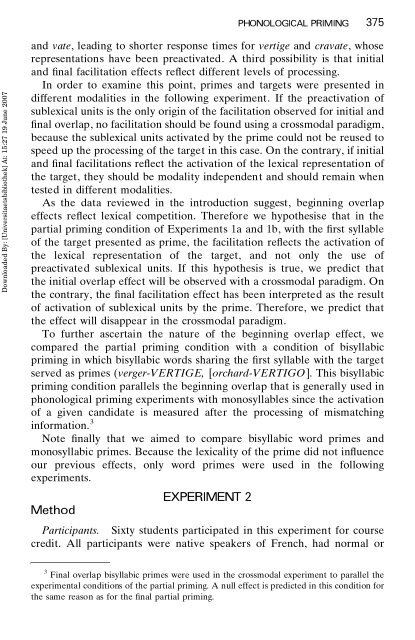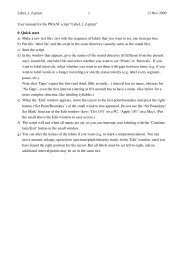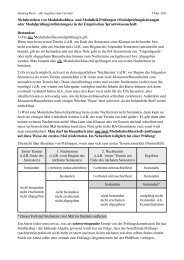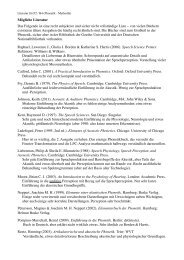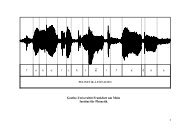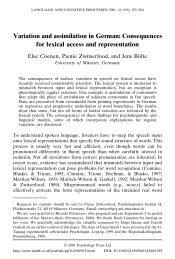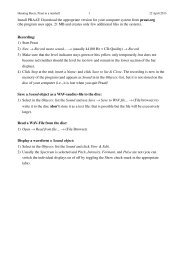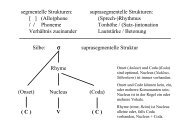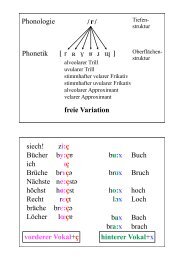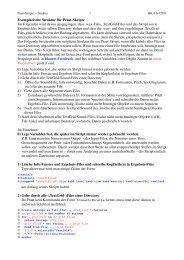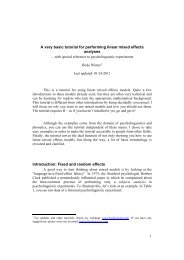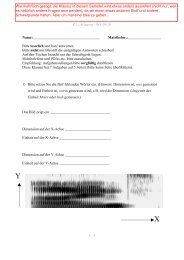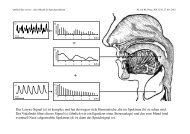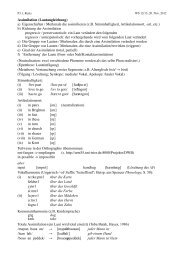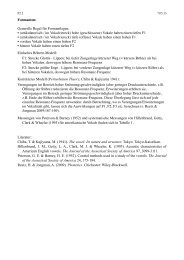Language and Cognitive Processes - Institut für Phonetik
Language and Cognitive Processes - Institut für Phonetik
Language and Cognitive Processes - Institut für Phonetik
You also want an ePaper? Increase the reach of your titles
YUMPU automatically turns print PDFs into web optimized ePapers that Google loves.
Downloaded By: [Universitaetsbibliothek] At: 15:27 19 June 2007<br />
PHONOLOGICAL PRIMING 375<br />
<strong>and</strong> vate, leading to shorter response times for vertige <strong>and</strong> cravate, whose<br />
representations have been preactivated. A third possibility is that initial<br />
<strong>and</strong> nal facilitation effects reect different levels of processing.<br />
In order to examine this point, primes <strong>and</strong> targets were presented in<br />
different modalities in the following experiment. If the preactivation of<br />
sublexical units is the only origin of the facilitation observed for initial <strong>and</strong><br />
nal overlap, no facilitation should be found using a crossmodal paradigm,<br />
because the sublexical units activated by the prime could not be reused to<br />
speed up the processing of the target in this case. On the contrary, if initial<br />
<strong>and</strong> nal facilitations reect the activation of the lexical representation of<br />
the target, they should be modality independent <strong>and</strong> should remain when<br />
tested in different modalities.<br />
As the data reviewed in the introduction suggest, beginning overlap<br />
effects reect lexical competition. Therefore we hypothesise that in the<br />
partial priming condition of Experiments 1a <strong>and</strong> 1b, with the rst syllable<br />
of the target presented as prime, the facilitation reects the activation of<br />
the lexical representation of the target, <strong>and</strong> not only the use of<br />
preactivated sublexical units. If this hypothesis is true, we predict that<br />
the initial overlap effect will be observed with a crossmodal paradigm. On<br />
the contrary, the nal facilitation effect has been interpreted as the result<br />
of activation of sublexical units by the prime. Therefore, we predict that<br />
the effect will disappear in the crossmodal paradigm.<br />
To further ascertain the nature of the beginning overlap effect, we<br />
compared the partial priming condition with a condition of bisyllabic<br />
priming in which bisyllabic words sharing the rst syllable with the target<br />
served as primes (verger-VERTIGE, [orchard-VERTIGO]. This bisyllabic<br />
priming condition parallels the beginning overlap that is generally used in<br />
phonological priming experiments with monosyllables since the activation<br />
of a given c<strong>and</strong>idate is measured after the processing of mismatching<br />
information. 3<br />
Note nally that we aimed to compare bisyllabic word primes <strong>and</strong><br />
monosyllabic primes. Because the lexicality of the prime did not inuence<br />
our previous effects, only word primes were used in the following<br />
experiments.<br />
Method<br />
EXPERIMENT 2<br />
Participants. Sixty students participated in this experiment for course<br />
credit. All participants were native speakers of French, had normal or<br />
3 Final overlap bisyllabic primes were used in the crossmodal experiment to parallel the<br />
experimental conditions of the partial priming. A null effect is predicted in this condition for<br />
the same reason as for the nal partial priming.


